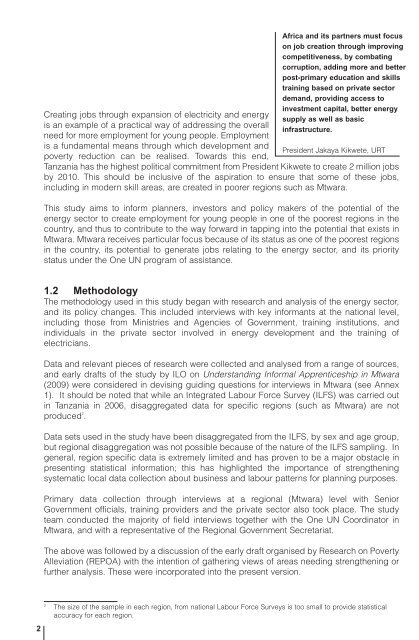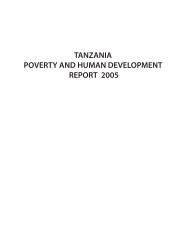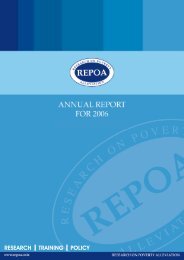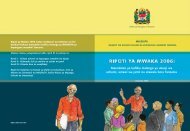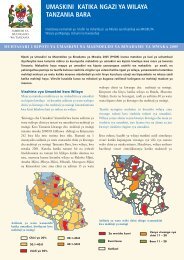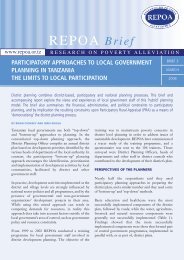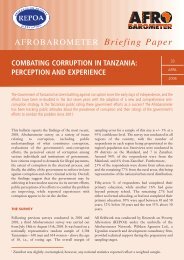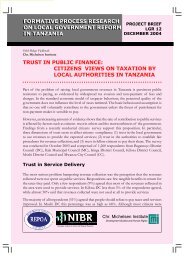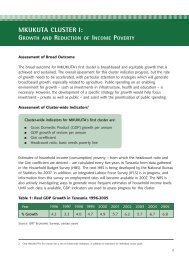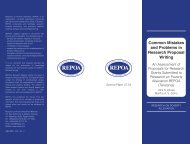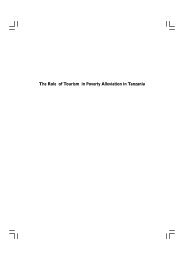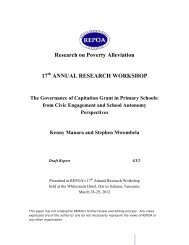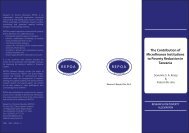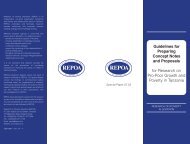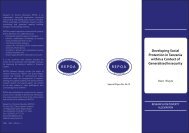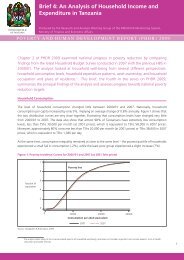Energy, Jobs and Skills - Repoa
Energy, Jobs and Skills - Repoa
Energy, Jobs and Skills - Repoa
Create successful ePaper yourself
Turn your PDF publications into a flip-book with our unique Google optimized e-Paper software.
Creating jobs through expansion of electricity <strong>and</strong> energy<br />
is an example of a practical way of addressing the overall<br />
need for more employment for young people. Employment<br />
is a fundamental means through which development <strong>and</strong><br />
poverty reduction can be realised. Towards this end,<br />
Africa <strong>and</strong> its partners must focus<br />
on job creation through improving<br />
competitiveness, by combating<br />
corruption, adding more <strong>and</strong> better<br />
post-primary education <strong>and</strong> skills<br />
training based on private sector<br />
dem<strong>and</strong>, providing access to<br />
investment capital, better energy<br />
supply as well as basic<br />
infrastructure.<br />
President Jakaya Kikwete, URT<br />
Tanzania has the highest political commitment from President Kikwete to create 2 million jobs<br />
by 2010. This should be inclusive of the aspiration to ensure that some of these jobs,<br />
including in modern skill areas, are created in poorer regions such as Mtwara.<br />
This study aims to inform planners, investors <strong>and</strong> policy makers of the potential of the<br />
energy sector to create employment for young people in one of the poorest regions in the<br />
country, <strong>and</strong> thus to contribute to the way forward in tapping into the potential that exists in<br />
Mtwara. Mtwara receives particular focus because of its status as one of the poorest regions<br />
in the country, its potential to generate jobs relating to the energy sector, <strong>and</strong> its priority<br />
status under the One UN program of assistance.<br />
1.2 Methodology<br />
The methodology used in this study began with research <strong>and</strong> analysis of the energy sector,<br />
<strong>and</strong> its policy changes. This included interviews with key informants at the national level,<br />
including those from Ministries <strong>and</strong> Agencies of Government, training institutions, <strong>and</strong><br />
individuals in the private sector involved in energy development <strong>and</strong> the training of<br />
electricians.<br />
Data <strong>and</strong> relevant pieces of research were collected <strong>and</strong> analysed from a range of sources,<br />
<strong>and</strong> early drafts of the study by ILO on Underst<strong>and</strong>ing Informal Apprenticeship in Mtwara<br />
(2009) were considered in devising guiding questions for interviews in Mtwara (see Annex<br />
1). It should be noted that while an Integrated Labour Force Survey (ILFS) was carried out<br />
in Tanzania in 2006, disaggregated data for specific regions (such as Mtwara) are not<br />
produced 2 .<br />
Data sets used in the study have been disaggregated from the ILFS, by sex <strong>and</strong> age group,<br />
but regional disaggregation was not possible because of the nature of the ILFS sampling. In<br />
general, region specific data is extremely limited <strong>and</strong> has proven to be a major obstacle in<br />
presenting statistical information; this has highlighted the importance of strengthening<br />
systematic local data collection about business <strong>and</strong> labour patterns for planning purposes.<br />
Primary data collection through interviews at a regional (Mtwara) level with Senior<br />
Government officials, training providers <strong>and</strong> the private sector also took place. The study<br />
team conducted the majority of field interviews together with the One UN Coordinator in<br />
Mtwara, <strong>and</strong> with a representative of the Regional Government Secretariat.<br />
The above was followed by a discussion of the early draft organised by Research on Poverty<br />
Alleviation (REPOA) with the intention of gathering views of areas needing strengthening or<br />
further analysis. These were incorporated into the present version.<br />
2<br />
2<br />
The size of the sample in each region, from national Labour Force Surveys is too small to provide statistical<br />
accuracy for each region.


